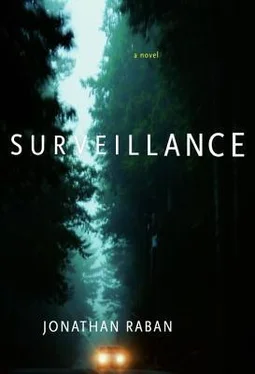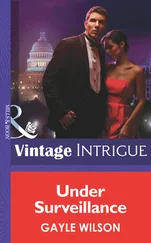“Measures,” they called them, but incremental nuisances was how Lucy saw them — the spreading rash of concrete barriers, barbed wire, magnetometers, spycams, nondescript gray boxes that were supposed to sniff out airborne pathogens. Over the last twelve months, these measures had been multiplying at speed. Lately they’d started mounting roadblocks on interstates. Next up, as the result of an act rushed through Congress, was the hassle of the biometric National ID card, deadline September for Washington state. The measures had driven a wedge between Lucy and Tad. To him they meant “fascism,” a word he used with a maddening carelessness; to her they were just signs of how jumpy and rattled this administration had grown since the attacks, perhaps for good reason. As far as she was concerned, the worst thing they’d done was to turn dinner with Tad into a conversational minefield. One evening last week, they’d found themselves staring daggers at each other across the table over the remains of the wine: “You’re being blind,” Tad had said. “You’re being obsessional,” she’d answered. Their six-year friendship was in peril because of the fucking measures.
This morning, the smoke over Seattle was taking the shape of an enormous many-petaled flower, like a wilting black hydrangea growing on a stalk from behind the green hills and unruffled sea. Fascinated in spite of herself, Lucy watched it grow until the raspy male voice came over the PA system, ordering passengers down to their cars.
Waiting for her turn to drive off, she switched on the radio. The morning show on the local NPR station was about salmon recovery, with a guy who’d written the book on it — so nothing too bad could have happened in Seattle if they were deep in a discussion about preserving spawning habitat. On Classic King FM she got a discordant flurry of horns, drums, and trumpets. Stravinsky, she guessed first, then changed her bet to Mahler.
Two lanky National Guardsmen, with machine guns on shoulder straps, stood by the ramp, eyes glazed, faces limp with boredom in the gathering heat. Their armored Humvee, parked at an angle beyond them, had a livelier expression, with its pig-eyed headlights and bared-teeth radiator grille. Humvees were everywhere now, lurking in downtown alleys, snarling at drivers from the median strips on freeways; they seemed to Lucy to possess the worst possible combination of maximal testosterone and minimal IQ. She veered wide left past this one, as if it might spring to life and bite.
Her holiday mood was gone. In a bid to recapture it, she pulled over at a strip mall to drop the top of the car. Madly impractical in every other way, the Spider could still lift Lucy’s spirits with its collapsing roof. Exactly nine months older than Alida, and with 123,000 miles on the clock, it was dear to her because she’d had to battle to hang on to it. There’d been two close encounters with repo men when she’d fallen behind in her payments. Her mother, seeing it for the first time, had let out the tragic shriek for which she’d been famous in Miles City. “Jesus God Almighty, Lucy, are you totally insane?” Then she’d begun to weep. Her mother meant the baby, of course, but it was the car that gave her the cue to reprise the role of Hedda Gabler, or was it Lady Macbeth?
In Alida’s early days, a single package of disposable diapers had filled the Spider’s trunk to capacity and beyond. At pick up time at school, parked in the fleet of minivans and SUVs, the green car drew meaningful looks from the parental crowd. It denoted Lucy’s singleness, selfishness, and general irresponsibility. Faced with the world’s disapproval, she’d grown more and more protective of the car, feeding it premium-grade gas, observing its service intervals as punctually as she did Alida’s medical and dental checkups, taking it to the body shop for cosmetic surgery whenever it got a scrape or ding. Usually careless of possessions, Lucy had the superstitious conviction that if she let the car go, the rest of her precarious life would go the way of the Spider, to rust and ruin.
It was in the car that she’d had her best conversations with Alida: strapped into their red leather bucket seats, both looking ahead, not catching each other’s eyes, they talked as they never did at home. On the run back from school, Alida would keep Lucy abreast of the cruel snakes-and-ladders game of sixth-grade friendships in a breathless stream of gossip, like a confiding sister. But the moment she stepped out of the Spider the talk stopped, mid-sentence, and she put on her new face, drawing the shutters and hanging out the “Closed” sign. So in the last few weeks Lucy had been taking ever more roundabout and eccentric routes through the city, trying to stay in touch with her disappearing daughter.
She loved to drive. She’d had her first lesson at eleven in her father’s white Jeep with government plates, dodging clumps of sagebrush on a stretch of open rangeland. “We won’t tell Mom,” he said, as Lucy, rapt, heart in mouth, hardly daring to breathe, piloted the Jeep in figure eights across the sun-baked gumbo clay. Driving was the nearest she could imagine to doing magic, and being sworn to secrecy doubled its enchantment. All that summer, driving figured thrillingly in her dreams, and by fall she was doing it by instinct, rattling lickety-split over the prairie with her dad in the passenger seat, even though she needed two fat cushions to see over the hood. Thirty-eight years on, she still hadn’t quite managed to entirely part company with that child, bursting with pride and excitement at being behind the wheel. Reading The Wind in the Willows to Alida, Lucy felt a certain rueful kinship to Mr. Toad.
So now, accelerating away from the strip mall, she went from first to fifth without putting her foot on the clutch, flipping the stick to neutral and judging the revs by ear for the moment to shift up — a silly trick, and not one she did often, but it made her smile to get it right. The music on the radio was lost to wind, tire rumble, and the growl of the exhaust. The dashboard clock said 9:14, and she wasn’t due to show up at August Vanags’ place until sometime after 10:30.
The road, barred with the regular shadows of plantation firs, was temptingly free of traffic. Speeding through inky greenery, the sun falling in bolts of white light between the trees, she was already on the lookout for the Useless Bay turnoff when, heeling-and-toeing around a wide bend, she nearly plowed into the backside of a silver sedan going so slowly that it barely seemed to be moving at all. As she braked, the sound of woodwind and strings came up around her in lush, bass-heavy stereo. So far as she could see, the next stretch of road was all bends. Turning on the emergency flashers to warn anyone coming up behind them, she settled behind the silver car, keeping her distance, with an anxious eye on the rearview mirror. The Spider and the sedan crept along in consort, a two-car funeral procession, winding through the woods at a stately twenty mph. Lucy craned her head to the side, looking for a chance to pass these geriatric sightseers, or whatever they were. No such luck. A short straightaway opened up ahead but was immediately occupied by an oncoming car. The music kept her guessing: now sweet, now angry, now like an old-time romantic waltz, now like all-out war, and never the same thing for more than seconds at a time. She’d heard it before but couldn’t place it, though she was still betting, at longish odds, on Mahler.
They were climbing a hill, its crest a liquid mirage-shimmer in the sun, when the accident happened — or, rather, when various bits of the accident presented themselves to Lucy, out of order.
She heard the crash as a musical explosion of drums and cymbals on the radio before she saw the car ahead wander across the yellow median line into the wrong lane, and the grinning, chrome-encrusted snout of the semi rise from the brow of the hill to meet it. The silver car gave itself a preliminary shake, then leaped, salmonlike, toward the sky. Lucy was momentarily dazzled by this living miracle — framed by the spiky blackness of the fir treetops, the marvelous car sailing scot-free through the blue. It caught the sun, a blinding wink of light. And here, suddenly up close, came the semi’s snout, which had lost its grin, the driver’s face looming behind glass way above her, his mouth a wide, astonished “o.”
Читать дальше












